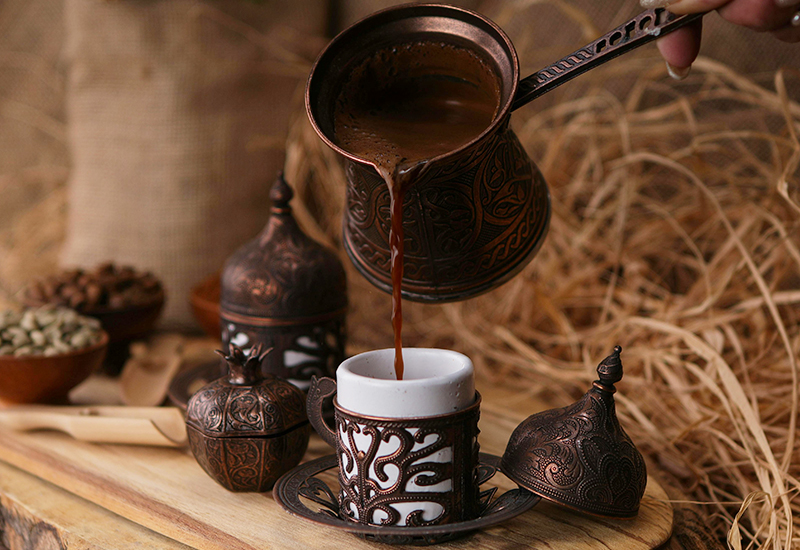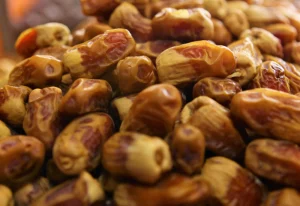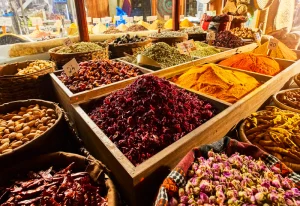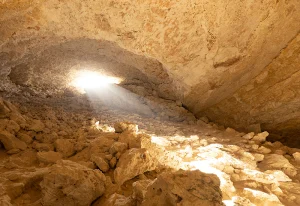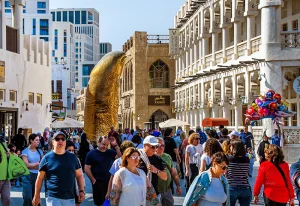Do you know that in Qatar, Arabic coffee is not just a beverage but a symbol of hospitality and tradition? Known as “qahwa” in the local language, it plays a vital role in bringing people together and creating a warm, welcoming atmosphere. Whenever you visit a Qatari home, you’ll be greeted with a steaming hot cup of freshly brewed Arabic Coffee, which is a sign of respect and friendship. Want to learn more about this fascinating aspect of Qatar culture and traditions? Keep reading!
Table of Contents
ToggleArabic Coffee Qatar
If you haven’t tried Arabic coffee, you’re missing out on an experience that’s deeply steeped in the cultural heritage of the Middle East! Known as “qahwa” or “gahwa,” this ancient brew is more than just a drink – it’s a symbol of hospitality, tradition, and social connection. In Qatar, preparing and serving Arabic coffee is an art form that’s been perfected over centuries, with every cup made with meticulous attention to detail.
The act of sharing qahwa in Qatari culture serves as a powerful tool to build connections between individuals. It promotes communication and companionship, while the rich aroma of freshly brewed Arabic coffee adds to the sensory delight of traditional Qatari gatherings. This cherished beverage continues to hold immense cultural value, bringing people together in a meaningful and inspiring way.
What Is Arabic Coffee?
Arabic coffee, or qahwa, is a traditional beverage enjoyed across the Middle East. Unlike the familiar dark roast of Western-style coffee, Arabic coffee is typically made from lightly roasted coffee beans, giving it a lighter color and a milder flavor profile.
Arabic coffee, a beverage with a rich cultural heritage, instills an experiential journey that transcends taste. The process of brewing this coffee requires meticulous care and attention, resulting in an aroma that permeates the air, symbolizing hospitality and tradition. Its cultural significance, coupled with its sensory allure, has cemented its position as an esteemed beverage.
The process of producing Arabic coffee is a multifaceted practice that involves a meticulous combination of lightly roasted coffee beans and water in a traditional pot. This process is not only an art form but also a ritual that requires careful attention to detail.
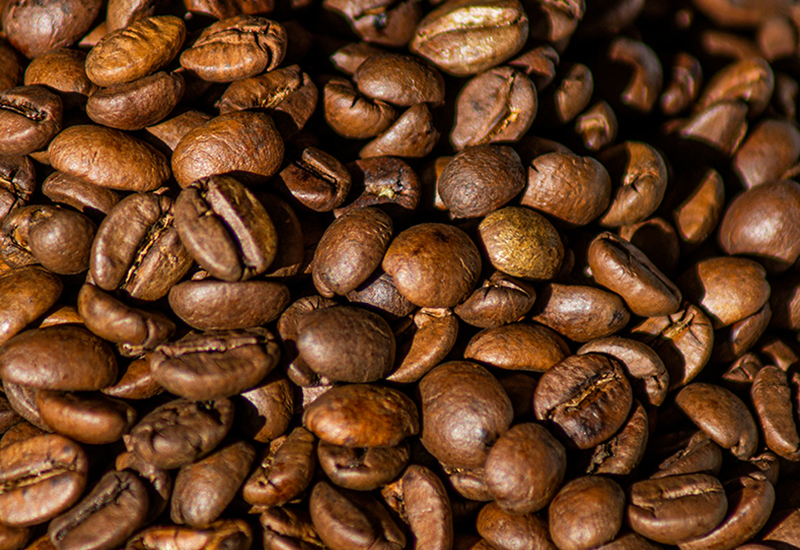
The coffee beans are methodically ground to ensure a consistent texture, and the mixture is then brewed to perfection. It is brewed by simmering finely ground coffee beans with water in a special pot called a “dallah,” often infused with aromatic spices like cardamom, cloves, ginger, or saffron. The resulting brew is served in small, handle-less cups known as “finjans,” accompanied by sweet treats like dates or pastries
What Is the Traditional Coffee of Qatar?
The traditional coffee of Qatar, like in much of the Arabian Peninsula, is Arabic coffee, locally known as “qahwa.” Qatari Arabic coffee is typically prepared by lightly roasting high-quality coffee beans and grinding them to a fine consistency.
The ground coffee is then brewed with water in a special pot called “dallah,” infused with aromatic spices such as cardamom, cloves, or saffron to enhance its flavor. Qatari Arabic coffee is served in small, handleless cups known as “finjans” alongside sweet treats like dates or pastries.
The serving of Arabic coffee in Qatar is accompanied by elaborate rituals, reflecting the importance of hospitality and tradition in Qatari society.
How to Make Arabic Coffee?
To make Arabic coffee traditionally and authentically, you need to follow an age-old method that has been passed down through generations. The recipe for Arabic coffee is quite simple and easy to understand.
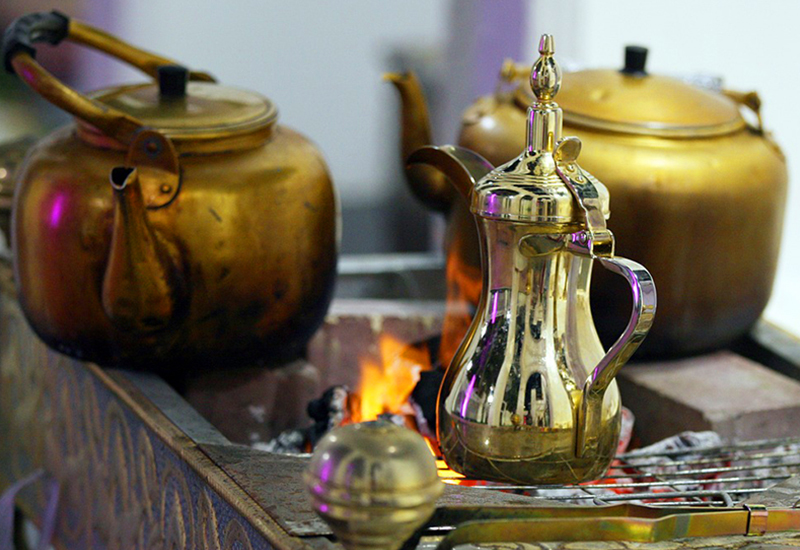
Begin by selecting high-quality, lightly roasted coffee beans and grinding them to a fine consistency. Next, fill a dallah, a traditional Arabic coffee pot, with water and add the freshly ground coffee, along with any desired spices such as cardamom or cloves.
Place the dallah over low heat and allow the mixture to simmer gently, ensuring that the flavors meld harmoniously without reaching a rolling boil.
The brewing process should be closely monitored, with occasional stirring to prevent scorching and to release the aromatic essence of the coffee. Once the brew reaches a rich, aromatic intensity, remove it from the heat and let it settle briefly before serving.
Pour the coffee into small, handleless finjans, be careful to avoid disturbing any sediment at the bottom of the dallah when pouring. Your coffee is ready, and what’s better than dates or other sweet treats to complement its flavor profile?
Dallah or Arabic Coffee Pot
The dallah, a traditional Arabic coffee pot, is a vessel of cultural and practical significance that embodies centuries of artistry and tradition. Meticulously crafted with keen attention to detail, this graceful and ornate pot is typically made of brass, copper, or stainless steel. Its elegant silhouette and intricate engravings evoke a sense of timeless beauty that is both functional and aesthetically pleasing.
The dallah features a long, curved spout that facilitates pouring, ensuring each cup is served with care and precision. Its sturdy handle provides a secure grip, allowing for effortless maneuvering during the brewing process.
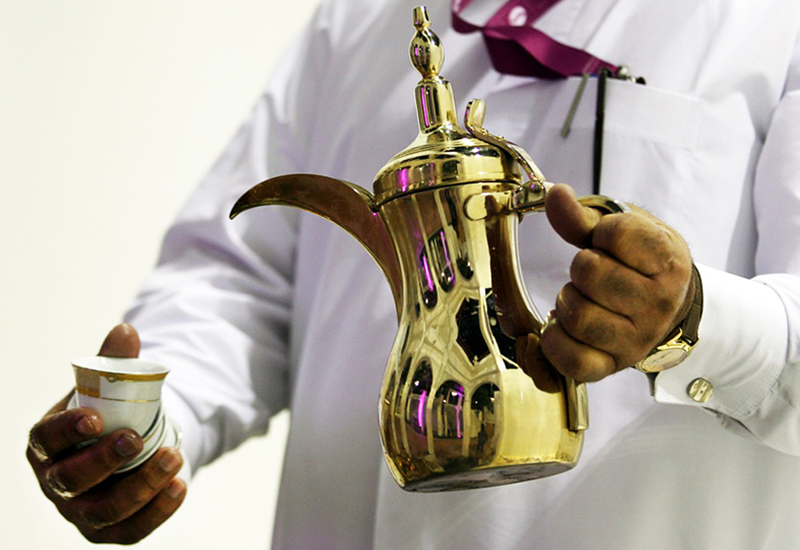
As a symbol of hospitality and tradition, the dallah holds a revered place in Arab households, promoting social gatherings and the practice of Arabic coffee rituals.
Arabic Coffee Beans
The artful combination of Arabic coffee beans and spices results in a captivating and multi-layered infusion that tantalizes the senses. The coffee beans are carefully handpicked and delicately roasted, producing a subtle yet distinct earthy aroma that forms the foundation of the beverage.
The spices, added in precise proportions, lend a complex and delicate flavor profile that dances on the palate and invites you to savor every sip. Together, these ingredients create a harmonious symphony that is as intriguing as it is inviting.
Arabic Coffee Spices
Cardamom, with its citrusy undertones, infuses the coffee with a refreshing brightness, while cloves add a warm, aromatic depth that lingers on the palate. Saffron, prized for its luxurious fragrance and golden hue, imparts a subtle sweetness that elevates the entire experience.
Together, these ingredients blend seamlessly, transforming a simple cup of coffee into a sensory journey that delights the senses and nourishes the soul. Their delicate flavor profile provides a canvas upon which the spices paint their vibrant hues of complexity.
Arabic Coffee Benefits
Arabic coffee offers a range of potential benefits beyond its delicious taste and cultural significance. Rich in antioxidants, it may help protect against cellular damage and reduce the risk of chronic diseases.
Additionally, the caffeine content in coffee can improve mental alertness and cognitive function, enhancing focus and productivity.
Some studies suggest that moderate coffee consumption may also lower the risk of certain health conditions, such as type 2 diabetes and Parkinson’s disease.
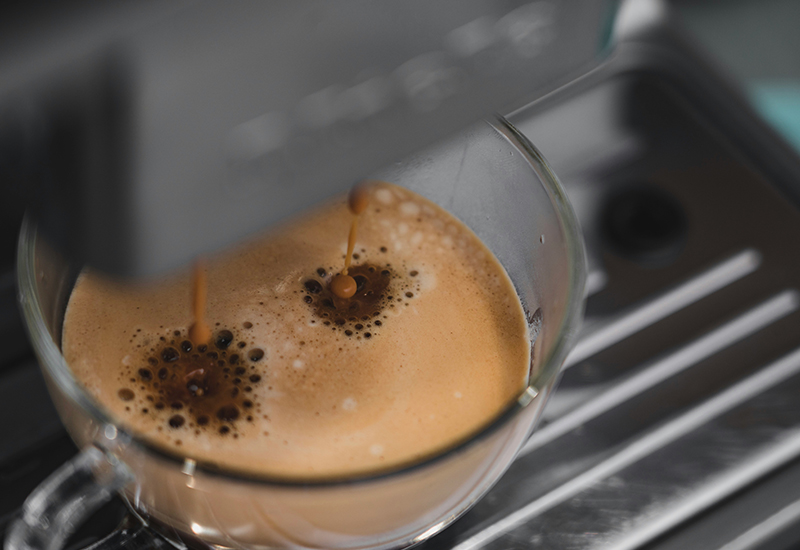
One of the interesting Arabic coffee benefits is the social aspect of enjoying Arabic coffee, which fosters connections and promotes a sense of community, contributing to overall well-being and mental health.
However, it is essential to consume Arabic coffee in moderation and be mindful of individual sensitivities to caffeine and other components.
Arabic Coffee Powder
Arabic coffee powder, essential to crafting the perfect cup of qahwa, is ground with meticulous precision to achieve the ideal consistency and flavor. Traditionally, Arabic coffee beans are lightly roasted to preserve their delicate flavors, then finely ground to a powder-like texture.
The grinding process is crucial, as it determines the coffee’s richness and aroma. Generally, the coffee powder is ground to a medium-fine consistency, allowing for the best extraction of flavors during brewing.
As for where to find the best Arabic coffee powder, it often depends on personal preference and regional variations. Arab countries like Saudi Arabia and the United Arab Emirates are renowned for producing high-quality Arabic coffee beans and powders, often featuring unique flavor profiles and blends specific to their regions.
Additionally, specialty coffee shops and online retailers may offer a diverse selection of coffee powders sourced from various producers, allowing enthusiasts to explore and discover their preferred blends.
Last Word
Arabic coffee represents cultural abundance, heritage, and generosity throughout the Middle East, including Qatar. The act of relishing Arabic coffee in Qatar is an extraordinary experience that takes you on a captivating sensory voyage, intensified by regional tastes and traditions.
The gentle fusion of delicately roasted coffee beans and aromatic spices produces a drink that is both comforting and refreshing, encouraging you to relish every sip amidst the heartening Qatari hospitality. Don’t wait any longer to experience the rich history and flavor of Arabic Coffee.
Are you planning to travel to Qatar and looking for a Qatar travel agency? Check out our Qatar tours, and Qatar transit tours.

